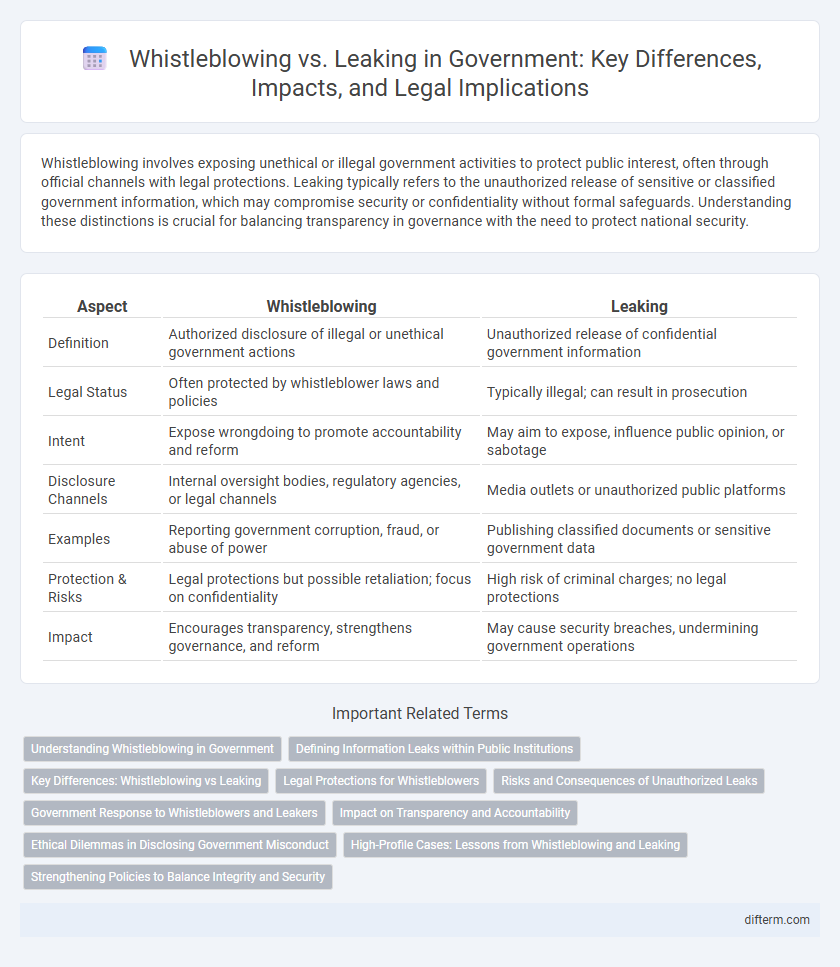Whistleblowing involves exposing unethical or illegal government activities to protect public interest, often through official channels with legal protections. Leaking typically refers to the unauthorized release of sensitive or classified government information, which may compromise security or confidentiality without formal safeguards. Understanding these distinctions is crucial for balancing transparency in governance with the need to protect national security.
Table of Comparison
| Aspect | Whistleblowing | Leaking |
|---|---|---|
| Definition | Authorized disclosure of illegal or unethical government actions | Unauthorized release of confidential government information |
| Legal Status | Often protected by whistleblower laws and policies | Typically illegal; can result in prosecution |
| Intent | Expose wrongdoing to promote accountability and reform | May aim to expose, influence public opinion, or sabotage |
| Disclosure Channels | Internal oversight bodies, regulatory agencies, or legal channels | Media outlets or unauthorized public platforms |
| Examples | Reporting government corruption, fraud, or abuse of power | Publishing classified documents or sensitive government data |
| Protection & Risks | Legal protections but possible retaliation; focus on confidentiality | High risk of criminal charges; no legal protections |
| Impact | Encourages transparency, strengthens governance, and reform | May cause security breaches, undermining government operations |
Understanding Whistleblowing in Government
Whistleblowing in government involves the lawful disclosure of information by an employee or insider about illegal, unethical, or unsafe practices within public agencies. This process is protected by specific laws such as the Whistleblower Protection Act in the United States, designed to safeguard individuals from retaliation. Understanding the distinction between whistleblowing and leaking is crucial, as whistleblowing follows legal protocols to promote transparency and accountability, while leaking often bypasses official channels and may involve unauthorized disclosure.
Defining Information Leaks within Public Institutions
Information leaks within public institutions involve the unauthorized disclosure of sensitive or classified government data, often bypassing official channels and oversight mechanisms. These leaks can expose systemic issues, corruption, or misconduct but differ from whistleblowing, which typically follows defined legal protections to report wrongdoing responsibly. Understanding the distinction is crucial for maintaining both transparency and national security in government operations.
Key Differences: Whistleblowing vs Leaking
Whistleblowing involves the authorized disclosure of information regarding unethical or illegal activities within a government entity, often protected by law to encourage accountability. Leaking refers to the unauthorized release of confidential government information, typically without formal protections, which can lead to legal consequences. The key difference lies in intent and legality: whistleblowing aims to expose wrongdoing for public interest under legal safeguards, while leaking may prioritize personal or political motives without official approval.
Legal Protections for Whistleblowers
Legal protections for whistleblowers are established through statutes such as the Whistleblower Protection Act, which safeguards individuals who report government misconduct from retaliation. These laws provide a formal framework ensuring confidentiality, job security, and legal recourse for whistleblowers, distinguishing them from leaks that often lack such protections. Enforcement agencies, including the Office of Special Counsel, play a crucial role in upholding these protections and promoting ethical transparency within government institutions.
Risks and Consequences of Unauthorized Leaks
Unauthorized leaks in government contexts expose sensitive information, risking national security and undermining public trust. Whistleblowing, when conducted through protected legal channels, aims to reveal misconduct while minimizing harm, but unauthorized leaks bypass these safeguards, leading to legal penalties and potential diplomatic conflicts. The consequences include compromised intelligence operations, exposure of classified data, and erosion of institutional credibility.
Government Response to Whistleblowers and Leakers
Government response to whistleblowers typically involves legal protections under acts like the Whistleblower Protection Act, ensuring confidentiality and shielding individuals from retaliation. In contrast, leakers often face criminal charges or administrative penalties due to unauthorized disclosure of classified or sensitive information. Agencies prioritize investigating leaks rigorously while balancing transparency demands and national security concerns.
Impact on Transparency and Accountability
Whistleblowing enhances transparency and accountability by exposing wrongdoing within government institutions while protecting the identity of the reporter to encourage ethical disclosures. Leaking often bypasses official channels, potentially compromising sensitive information and causing political or security risks, though it can also prompt necessary public scrutiny. Effective government policies balance the protection of whistleblowers and the control of leaks to maintain institutional integrity and public trust.
Ethical Dilemmas in Disclosing Government Misconduct
Whistleblowing involves the ethical decision to report government misconduct through official channels, balancing public interest with legal obligations and personal risk. Leaking, often unauthorized and anonymous, raises concerns about transparency versus the potential harm caused by uncontrolled information release. Both practices pose complex ethical dilemmas surrounding loyalty, accountability, and the protection of public trust in government institutions.
High-Profile Cases: Lessons from Whistleblowing and Leaking
High-profile cases such as Edward Snowden's NSA revelations and Chelsea Manning's Afghan War logs highlight critical distinctions between whistleblowing and leaking, emphasizing intent, legality, and public interest. Whistleblowing typically involves exposing government wrongdoing through official channels or legal frameworks, while leaking often bypasses these avenues, raising complex ethical and security concerns. Lessons from these cases underscore the necessity for robust legal protections for whistleblowers and clear policies to manage information disclosure responsibly within government institutions.
Strengthening Policies to Balance Integrity and Security
Strengthening policies on whistleblowing and leaking is crucial for balancing government integrity and national security by clearly defining legal protections and accountability measures for individuals who expose misconduct without compromising sensitive information. Implementing robust frameworks enhances transparency, encourages ethical reporting, and mitigates risks associated with unauthorized disclosures. Prioritizing comprehensive training and secure communication channels further safeguards classified data while promoting responsible governance.
Whistleblowing vs Leaking Infographic

 difterm.com
difterm.com